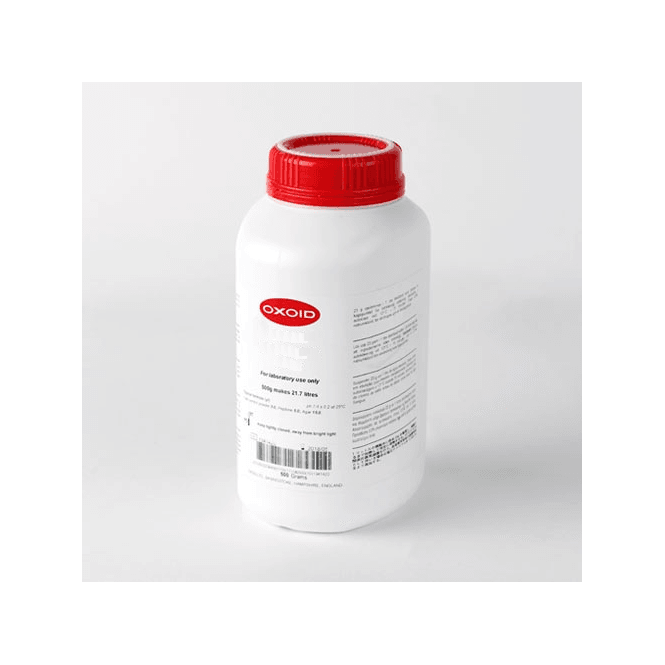Thermo Scientific™ Oxoid™ MYP Agar (Dehydrated)
Catalog No :
CAS Number :
Brand :
In Stock
Specifications:
| Application | Microbiology | ||
| Storage Temperature | Ambient | ||
| Product Type | Culture Medium | Forms | Powder |
| Product Brand | Thermo Fisher Scientific™ | ||
| Product Grade | Microbiology grade | ||
The Thermo Scientific™ Oxoid™ MYP Agar (Dehydrated) is a selective and differential medium designed for the enumeration of Bacillus cereus in food samples. Its diagnostic features are based on Bacillus cereus' inability to utilize mannitol and its production of phospholipase C, resulting in a distinctive opaque halo around colonies. With the inclusion of Polymyxin B, the medium selectively inhibits Gram-negative bacteria, facilitating accurate differentiation and identification of Bacillus cereus.
Key Features
- Selective:
- Polymyxin B effectively inhibits Gram-negative bacteria, allowing specific recovery of Bacillus cereus.
- Differential:
- Bacillus cereus is identified by its inability to ferment mannitol and its production of phospholipase C, forming opaque halo zones around colonies.
- Reliable and Sensitive:
- Detects even low levels of Bacillus cereus, ensuring accuracy in food safety testing.
- Easy-to-Interpret Results:
- Differentiates Bacillus cereus colonies with distinct zones of precipitation from other Gram-positive organisms.
- High Yield:
- Each 500g package yields 11.6L of prepared medium, making it cost-effective for large-scale testing.
Applications
1. Food Microbiology
- Enumeration and detection of Bacillus cereus in contaminated food products, including dairy, meat, and processed foods.
- Food safety testing and quality control in food manufacturing and processing environments.
2. Public Health and Regulatory Testing
- Adheres to industrial and regulatory standards, including AFNOR, AOAC, BSI, FDA, ISO, and NMKL, for the detection of foodborne pathogens.
3. Environmental Microbiology
- Monitoring Bacillus cereus contamination in food processing facilities and environmental samples.
Specifications
| Attribute | Details |
|---|---|
| Type | Agar |
| Form | Powder |
| Description | MYP Agar |
| Selective Agent | Polymyxin B |
| Yield | 11.6L of medium per 500g package |
| Certifications | AFNOR, AOAC, BSI, FDA, ISO, NMKL |
| Unit Size | Each |
Preparation Instructions
- Suspend: Suspend 43g of MYP Agar in 1 liter of distilled water.
- Mix and Heat: Heat with frequent agitation to dissolve the powder completely. Do not autoclave.
- Supplement: Cool the medium to 45–50°C and aseptically add Polymyxin B supplement (Oxoid SR0099E) if required.
- Dispense: Pour the prepared medium into sterile Petri dishes and allow to solidify.
Diagnostic Features
| Characteristic | Observation |
|---|---|
| Mannitol Utilization | No fermentation by Bacillus cereus, differentiating it from other organisms. |
| Phospholipase C Production | Formation of opaque halo zones around Bacillus cereus colonies. |
| Colony Morphology | Distinctive colonies with precipitation zones. |
| Selectivity | Suppresses most Gram-negative bacteria. |
Advantages
- Selective and Differential: Facilitates specific detection of Bacillus cereus in complex food matrices.
- Accurate Diagnosis: Reliably differentiates Bacillus cereus colonies from other organisms.
- High Sensitivity: Suitable for detecting low concentrations of Bacillus cereus in food samples.
- Cost-Effective: High yield ensures economical use in food safety testing.
- Standards Compliance: Meets international regulatory and industrial standards for food microbiology.
Storage and Stability
- Storage: Store the dehydrated medium in a cool, dry environment at 10–30°C.
- Shelf Life: Refer to the product label for expiration date.
References
- Mossel, D.A.A.; Koopman, M.J.; Jongerius, E. (1967). Appl. Microbiol., 15: 650–653.
Packaging
- Product: MYP Agar (Dehydrated)
- Quantity: 500g
- Yield: 11.6L of prepared medium
The Thermo Scientific™ Oxoid™ MYP Agar is a reliable, selective, and differential medium designed for the enumeration of Bacillus cereus in food samples. Its diagnostic clarity, high sensitivity, and compliance with international standards make it an indispensable tool for food safety and quality assurance in microbiology laboratories.




 0
0
